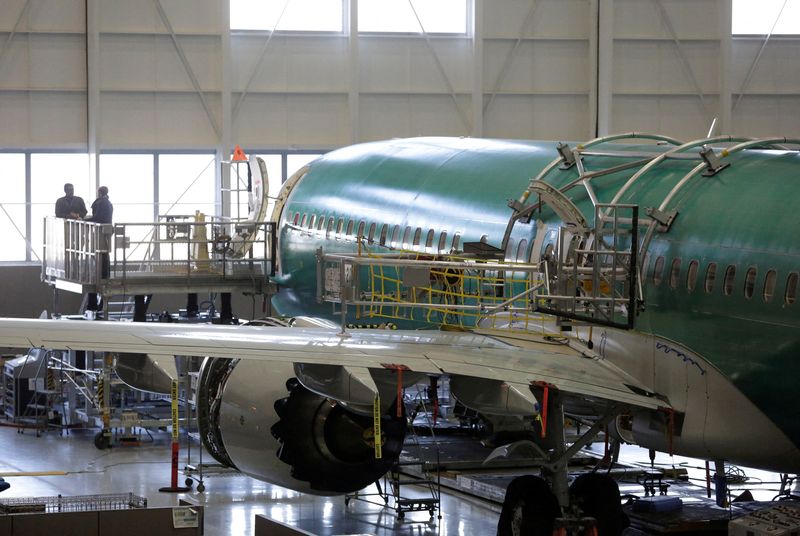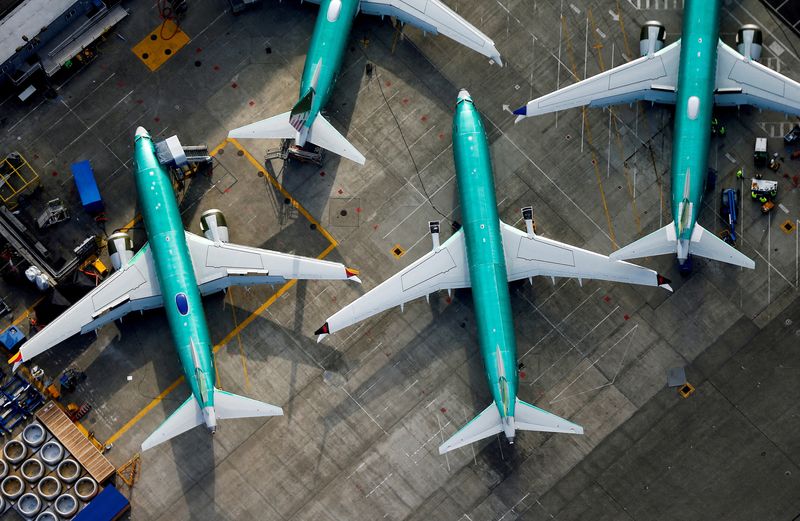By Tim Hepher and Allison Lampert
(Reuters) -Boeing 737 MAX jetliner production has fallen sharply in recent weeks as U.S. regulators step up factory checks and workers slow the assembly line outside Seattle to complete outstanding work, industry sources told Reuters.
The FAA has imposed a cap of 38 jets a month following a blowout on a 737 MAX in January, blamed on an assembly error. But the monthly output rate is fluctuating well below this level and in late March fell as low as single digits, they said.
Boeing (NYSE:BA) referred to comments by CFO Brian West who said last month it was taking comprehensive steps to strengthen quality and build confidence - including reducing the amount of so-called travelled or pending work - as the FAA increases audits.
West told a Bank of America event that the FAA was "deeply involved and undertaking a tougher audit than anything we've ever been through before."
Boeing also says it has made efforts to reduce the amount of so-called "travelled work" - or planes moving down the line with jobs still needing to be fixed from earlier work stations. The effect is to slow overall production and, in turn, deliveries.
Boeing has faced increased scrutiny following the loss of a door plug on an Alaska Airlines jetliner in January. Shares in the planemaker ended down 1.7%.
Planemakers get paid for their jets upon delivery, but the underlying production rate dictates the pulse of an industrial system feeding thousands of aerospace suppliers worldwide.
Boeing's production slowdown is also expected to ripple through the airline industry, with carriers shaving flights from their schedule or extending existing jet leases to meet demand.
Traditionally, production and deliveries went hand in hand, but the grounding of the MAX in 2019 and 2020 and disruption from the pandemic created a stockpile of surplus jets that mean it is harder now to glean the production rate from deliveries.
To try to understand how fast Boeing's main cash cow is being built, independent experts study the number of first test flights being carried out for individual new jets each month.
Rob Morris, global head of consultancy at Cirium Ascend, said Boeing flew 13 MAXs in March, following 11 in February. The rate peaked around 38 a month in mid-2023, Cirium data shows.
Airbus, by contrast, flew an average of 46 a month of its competing A320neos in the first quarter, Morris said.
ENGINE SURPLUS
Boeing's European rival has its own supply constraints and is producing around 50 A320neo-family jets a month, below the 58 originally targeted early this year, industry sources have said.
It also faces ongoing shortages of maintenance capacity for some engines, leaving jets idle for months once in service.
But with Boeing having to slow production sharply in order to satisfy FAA inspectors that its industrial operations are working smoothly, Airbus has extended a comfortable lead in the market for the most-sold category of single-aisle jets.
Any prolonged output slump has potential repercussions for engine maker CFM International, co-owned by newly standalone supplier GE Aerospace and France's Safran (EPA:SAF).
As sole engine supplier for the MAX, CFM gets paid for the engines when the fully completed jets are delivered to airlines - not when the parts are sent to Boeing, as with most suppliers.
GE Aerospace CEO Larry Culp said last month Boeing was still taking deliveries for LEAP-1B engines at the contracted rate.
Agency Partners analyst Nick Cunningham said the companies would try to keep this status quo for as long as possible, but some industry sources questioned how long the resulting surplus of engines could keep building up. CFM had no immediate comment.

In December 2019, when the grounded 737 MAX was eight months into an earlier safety crisis, halting plane production, CFM struck a deal to keep supplying 10 engines a week to Boeing, which it described as the minimum level needed to cover costs.
It also reached an agreement that called for Boeing to pay for the engines over a period of two years, Safran said later.
